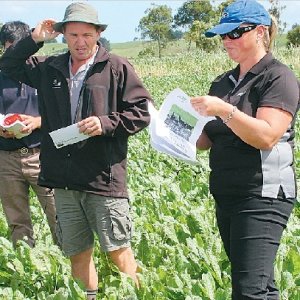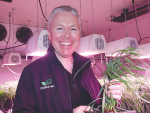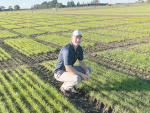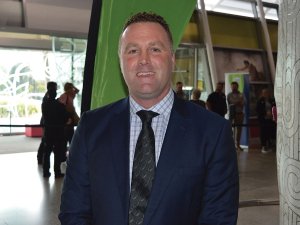KIKUYU-BASED PASTURES could provide more feed more reliably than ryegrass pastures in Northland if they were managed properly, according to interim results from work due for completion at the end of this season on a Northland research
farm.
A four-year study at the Northland Agricultural Research Farm (NARF) compared a ryegrass-based system, a mulched kikuyu-based system and a non mulched-kikuyu system on three separate plots.
Results from the survey so far indicate that not only has the mulched kikuyu system worked better in drought years, it also out-performs rye pastures in good seasons such as that enjoyed by farmers in the 2010-11 year.
Cows on the mulched kikuyu farm produced 1087kgMS in the 2008-09 season, 1054kgMS in 2009-10, 1230kgMS in 2010-11 and a forecast 1320kgMS in 2011-12.
This is compared to 1174kgMS, 984kgMS, 1100kgMS and 1100 kgMS on the ryegrass farmlet and 1054kgMS, 999kgMS, 1150kgMS and 1150kgMS on the non-mulched kikuyu farm during the same period.
NARF consultant Rod Hodgson says once managed properly kikuyu can be a consistent high-producing system in the north.
"The difference was marked especially in the 09-10 and 10-11 seasons when the north was going through those two droughts," he says.
Farm managers also fed palm kernel to cows on all farmlets to ensure animals were in good condition at mating and calving time and, according to NARF farm science manager Kate Wynn, cows on the kikuyu ended up eating more.
In fact, in the 2011-12 season, cows on the mulched pastures consumed 870kgDM of palm kernel, while cows on the non-mulched kikuyu pastures ate 910kgDM and cows on the ryegrass 650kgDM.
In fact, cows on the mulched kikuyu farmlet ate 2000kgDM/year more than those on the other two systems.
To maintain pasture quality and ensure cows got a good standard of feed Italian ryegrasses were undersown into mulched kikuyu pastures and oversown onto non-mulched kikuyu paddocks.
Italian rye grass was selected because of its growing cycle and its hardiness compared to other pasture types.
"You wouldn't use anything other than the true Italian ryegrasses – no anglos and no Perenials," Hodgson says.
However, palm kernel and extensive regrassing policies come at a cost. In the current season regrassing and feed costs sat at $1125/ha for the ryegrass farm compared to $1910/ha for the mulched kikuyu and $1555 for the un-mulched kikuyu farm.
Even with higher costs worked in, the mulched kikuyu farm was more profitable than the ryegrass farm by $535/ha, and this difference was more marked in drought years where it made $1000 more a hectare than the ryegrass farm.
Hodgson says contractors have done all machinery work on the farm due to the size of the farmlets and the nature of the farm. "Larger operators who can justify the purchase of larger implements could bring those regrassing costs right down."
With kikuyu growth dropping off in early autumn and ryegrass not picking up until late autumn, Hodgson says crops, especially plantain and chickory that grew well in late summer-early autumn would be a good addition to the system. "A crop like chickory or plantain would really make this system hum" .


















